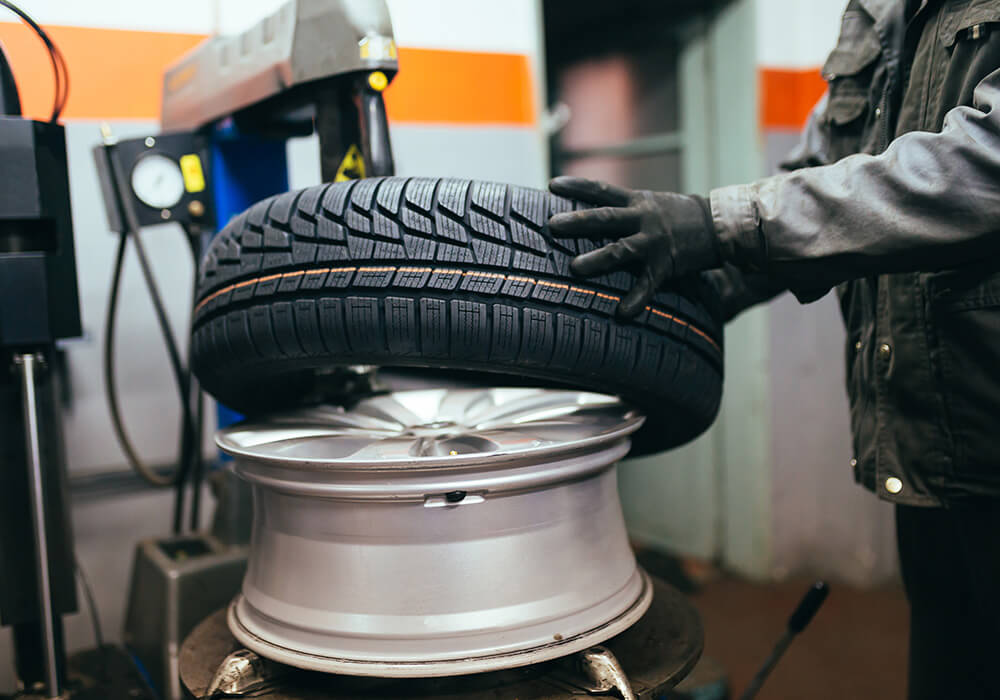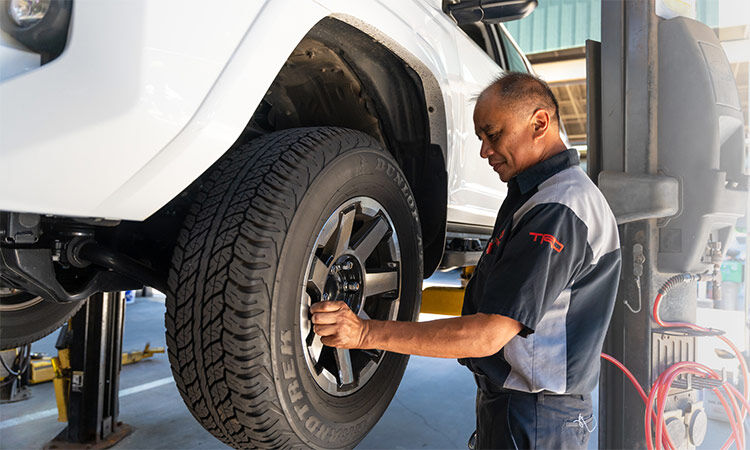Drive with Confidence: GMC Tires Service at Morris Tires
Tire Service: The Effect of Weather Condition Conditions
When it comes to making sure ideal efficiency and safety on the roadway, understanding the effect of climate conditions on tire solution is important. GMC Tire Service. In this conversation, we will check out the detailed partnership between weather condition conditions and tire solution, losing light on the relevance of weather-specific tire maintenance techniques and considerations.
Heat and Tire Performance
When revealed to high temperatures, tires experience adjustments in efficiency that can substantially impact automobile safety and handling. The warmth created from prolonged driving or warm climate conditions triggers the tire rubber to soften, leading to decreased tread life and enhanced wear. As the rubber ends up being softer, the tire's grip when traveling lessens, influencing stopping distances and total traction. In extreme cases, excessive heat can also create tire blowouts, positioning an extreme safety and security risk to the vehicle and its passengers.

Winter Effects
Cold climate problems can have a significant effect on tire efficiency and safety. As temperatures decline, tire rubber can solidify, resulting in reduced traction on icy or snow-covered roadways. In cold climate, tires may additionally shed air stress much more swiftly, which can impact handling and fuel effectiveness. Additionally, chilly temperature levels can create tire sidewalls to stiffen, enhancing the threat of damage from holes or other road hazards.
To reduce the results of winter on tires, it is important to consistently check tire stress and inflate them to the manufacturer's advised levels. Making use of winter season or all-season tires created for winter conditions can also boost traction and grasp on icy or snowy roadways. Correct tire maintenance, consisting of normal examinations for wear and damages, becomes also extra critical during cooler months to make sure optimal performance and safety.
Rainy Conditions Effect
Throughout wet problems, tire performance and safety and security can be dramatically affected by the wet roadway surfaces and lowered presence. The tread pattern of tires plays a critical duty in keeping traction on damp roadways. Tires with worn-out footsteps are a lot more vulnerable to hydroplaning, where a layer of water constructs up in between the tire and the roadway surface, leading to loss of grip. To combat this, drivers need to frequently evaluate their tires for sufficient tread depth and take into consideration purchasing tires specifically designed for wet problems.
Furthermore, rainy climate can likewise decrease presence, making it testing for drivers to see the road ahead plainly (GMC Tire Service). In such conditions, it is important to adjust driving speeds appropriately and preserve a secure complying with distance to allow for unexpected quits. Effectively inflated tires can additionally help in preserving control on wet roads by giving much better handling and grip
Snow and Tire Security
Snow-covered roads posture unique obstacles for motorists, highlighting the relevance of proper tire choice and upkeep. When driving in snowy conditions, having the right tires can make a considerable distinction in safety and performance. Wintertime tires are designed with unique rubber substances and tread patterns to offer much better traction on snow and ice contrasted to all-season tires. The deeper treads and sipes of winter months tires aid hold the roadway better, lowering the risk Visit Your URL of gliding and slipping.

It is vital to adhere to producer instructions when using and installing tire chains to stop damage to the tires and vehicle. By choosing the ideal tires, preserving correct inflation, and taking into consideration extra grip aids like tire chains, chauffeurs can enhance their safety when browsing snow-covered roads.
Weather-Related Tire Upkeep
When confronted with different weather, correct tire upkeep becomes a critical aspect of car safety and security and efficiency. Weather-related tire upkeep incorporates a range of practices focused on guaranteeing ideal tire function and long life in different weather scenarios. One crucial aspect of weather-related tire maintenance is tire pressure regulation. Varying temperatures can trigger tire stress to differ, impacting traction and fuel performance. Routinely inspecting and readjusting tire pressure according to maker suggestions is necessary for safe driving in altering weather condition problems. In addition, tire step deepness plays a considerable duty in taking care of various weather condition elements. Tires with sufficient tread deepness provide far better hold on damp or icy roads, lowering the risk of hydroplaning or skidding. When step wear gets to a particular deepness is important for preserving traction and security in damaging weather condition, inspecting tire tread frequently and changing tires. By focusing on weather-related tire upkeep, chauffeurs can boost security, improve car efficiency, and prolong the life expectancy of their tires.
Conclusion
To conclude, climate condition have a considerable influence on tire performance and safety and security. From warm impacting tire stress and use to cool weather condition minimizing traction, it is important to think about the weather condition when keeping and making use i was reading this of tires. Rainy conditions can reduce hold and cause hydroplaning, while snow can enhance the threat of mishaps if tires are not appropriately furnished. Weather-related tire upkeep is crucial in guaranteeing ideal performance and safety on the roads.
In this conversation, we will certainly check out the complex relationship in between weather conditions and tire solution, losing light on the importance of weather-specific tire upkeep techniques and factors to consider.
